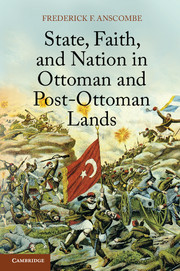Book contents
- Frontmatter
- Dedication
- Contents
- List of Maps and Images
- Acknowledgments
- Transliteration and Abbreviations
- Maps
- Introduction
- Part I The Ottoman Empire
- Part II From Ottoman to Post-Ottoman States
- Part III Contemporary Post-Ottoman States
- 9 The Contemporary Balkans
- 10 Contemporary Turkey
- 11 Contemporary Arab Countries
- Conclusion State, Faith, and Nation
- Bibliography
- Index
- References
10 - Contemporary Turkey
Published online by Cambridge University Press: 05 June 2014
- Frontmatter
- Dedication
- Contents
- List of Maps and Images
- Acknowledgments
- Transliteration and Abbreviations
- Maps
- Introduction
- Part I The Ottoman Empire
- Part II From Ottoman to Post-Ottoman States
- Part III Contemporary Post-Ottoman States
- 9 The Contemporary Balkans
- 10 Contemporary Turkey
- 11 Contemporary Arab Countries
- Conclusion State, Faith, and Nation
- Bibliography
- Index
- References
Summary
Just as the resurgence of nationalism, religion, and conflict in the Balkans revived Western interest in the Ottoman period of control over that peninsula and sparked speculation about the empire’s legacy there, so the course of Turkish politics since the 1980s has reopened the old question of where “Turkey” (first the Ottoman empire and now the Republic of Turkey) belongs. Is it part of Europe, deserving of admission into the European Union? Or does the revival of Islam in public life, which gives another twist to the idea of “neo-Ottomanism,” undermine all that Atatürk achieved and mark Turkey as enduringly “oriental”? The repeated successes of political parties deemed “Islamic” has provided ammunition for opponents of Turkey’s entry into the EU, to whose arsenal of antiadmission rationales centered on objection to Turkey’s “denial of the Armenian genocide” are now added warnings over letting “Islamic fundamentalism” disrupt the union. Such warnings seem comic in comparison to the question of genocide, not only because the Islam in Turkish politics bears little resemblance to that of countries such as Saudi Arabia that are usually called to mind by the term “fundamentalism,” but also because Brussels would find Turkey’s secular nationalists no easier to manage or manipulate. The EU in its original form bound together six countries that welcomed an institutional brake to nationalism following the experiences of the world wars, but as it has expanded into areas that feel little link or responsibility for the wars (other than as victims), the communal sense of disapproval of overtly nationalist regimes has weakened. Kemalist Turkey would add another member to the growing “awkward squad” of the EU, made up of countries with strong characteristics of prickly state nationalism, including Greece and the former Warsaw Pact countries of Eastern Europe. Turkey has a clear record as part of NATO since 1952, however, proving a consistent, reliable member under both Kemalist and “Islamic” party regimes, despite earning a reputation as a tough bargainer within the alliance.
- Type
- Chapter
- Information
- State, Faith, and Nation in Ottoman and Post-Ottoman Lands , pp. 254 - 269Publisher: Cambridge University PressPrint publication year: 2014



